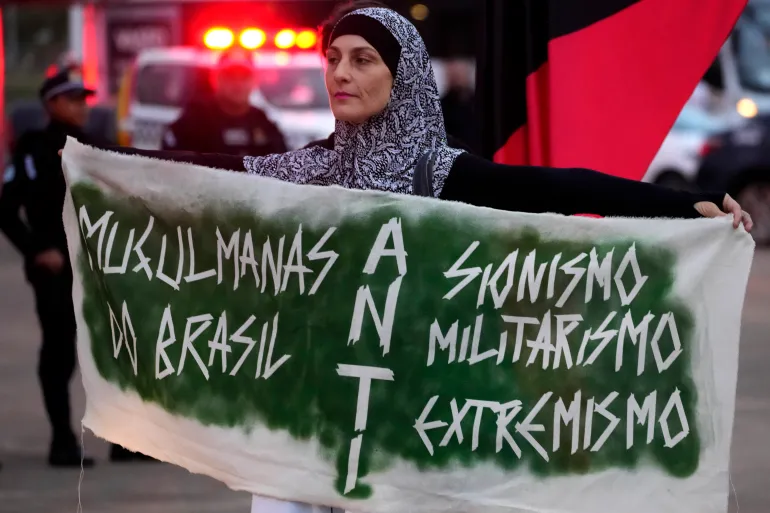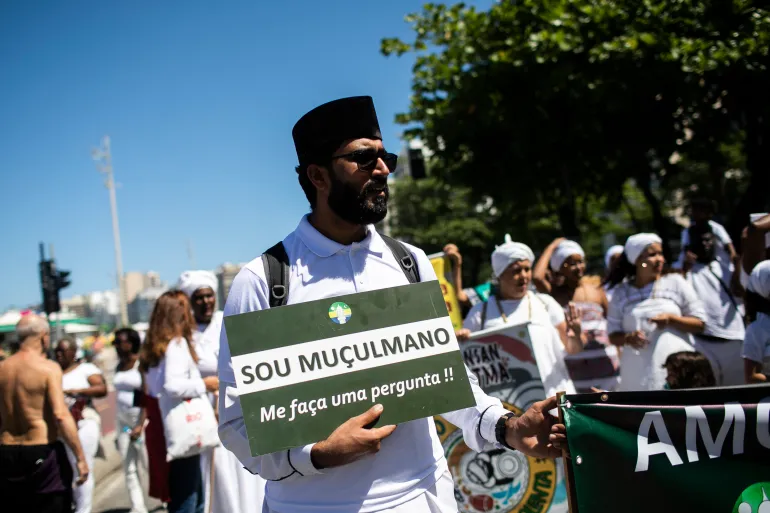(CTN News) – Batull Sleiman, a physician at a hospital in São Paulo, Brazil, reported that patients frequently arrived in a bad mood at the emergency room.
After all, each day brought fresh medical emergencies and pleas for urgent care. Sleiman had seen everything. But she didn’t expect the kind of rage she received many weeks ago.
A patient entered her examining room, irritated by the time he had waited for a doctor’s attention. Sleiman noted that his problem was “not urgent”. Nonetheless, he accused her of disrespect based on how she handled him.
“You’re being rude with me because you’re not from Brazil,” Sleiman recalls him saying. “If you were in your country…”
Survey findings on Muslim Brazilians experiencing harassment.
Sleiman stated that she turned away rather than hear the rest. The daughter of Lebanese immigrants believes the man’s reaction was motivated by one factor: her hijab.
“I was surprised and outraged,” Sleiman told Al Jazeera. However, she added, the mood in Brazil has become more hostile since the conflict in Gaza began. “I’ve been noticing that people have been staring more at me on the street since October.”
However, Sleiman is not alone in feeling singled out. As the battle in Gaza continues, Brazil is one of many countries concerned about religious prejudice, notably against its Muslim community.
According to a recent poll conducted by the Anthropology Group on Islamic and Arab Contexts at the University of São Paulo, Muslim Brazilians have reported pervasive harassment since the war began.
An estimated 70% of respondents indicated they knew someone who had faced religious discrimination since October 7, when the Palestinian group Hamas began an offensive on southern Israel, killing 1,140 people.

Israel has subsequently launched a military offensive against Gaza, a Palestinian territory, killing over 21,000 Palestinians. This approach has sparked human rights concerns, with UN experts warning of a “grave risk of genocide”.
According to Professor Francirosy Barbosa of the University of São Paulo, the events of October 7 resulted in religious intolerance in Brazil due to the conflation of Palestinian and Muslim identities, even though Palestinians are an ethnic community rather than a religious one.
She directed the November poll of 310 Muslim Brazilians. Respondents, she noted, reported receiving insults reflecting tensions in the Gaza conflict.
“Many Muslim women told us they are now called things like ‘Hamas daughter’ or ‘Hamas terrorist’,” she stated in an interview with Al Jazeera.
The online survey revealed that many of the respondents had firsthand experience with religious prejudice.
“About 60 percent of the respondents affirmed that they suffered some kind of offence, either on social media or in their daily lives at work, at home or in public spaces,” Barbosa said in a press release.
The study found that women reported slightly greater incidences of religious prejudice.
This month, a video on social media showed a resident of Mogi das Cruzes, a neighbourhood of São Paulo, approaching a Muslim woman and pulling her hijab, bringing the issue of Islamophobia to national attention. The footage was also aired on major networks such as CNN Brazil.
Karen Gimenez Oubidi, also known as Khadija, was married to a Moroccan guy and converted to Islam eight years ago. She told Al Jazeera that the argument involved one of her neighbours, and she was unhappy because their children had argued.
“She came down with her brother and was extremely aggressive.” She called me a ‘cloth-wrapped bitch’. I quickly saw it wasn’t only about the kids fighting,” Gimenez Oubidi stated.

The neighbours sought to separate the two women. One man in the video, however, grabbed Gimenez Oubidi from behind and wrapped an arm around her throat to restrain her. Gimenez Oubidi described him to Al Jazeera as her neighbour’s brother.
Encouraging Muslim Brazilians to speak up and raise awareness for government action.
He asked me several times, ‘What are you doing now, terrorist?’ He didn’t say it loudly; it was only for me to hear. “He knew what he was doing,” Gimenez Oubidi explained. She stated that her son’s fight with the neighbour’s youngster was also about her hijab.
Fernanda, the lady who attacked Oubidi, denied this narrative, saying she did not want her real identity exposed for fear of public outrage.
Fernanda claimed Oubidi’s son hit her son on the playground, and while she physically assaulted Fernanda, she made no mention of her faith. “I never mocked her for her religion. That did not happen. “I’d never do something like that,” she replied.
According to a July government assessment, religious intolerance “occurs most intensely against those of African origin, but it also affects Indigenous, Roma, immigrant, and converted individuals, including Muslims and Jews, as well as atheist, agnostic, and non-religious people”.
Brazil is largely Christian, with an estimated 123 million Catholics—more than any other country.
But it has a long-standing, albeit modest, Muslim community. Academics believe Islam entered the area through the transatlantic slave trade, as captured African Muslims practised their religion in their new surroundings.
In 1835, one group of enslaved Muslim Brazilians launched a rebellion against the government known as the Malê insurrection, which was named after the Yoruba word for Muslim.
Brazil’s Muslim community grew in response to waves of immigration in the late nineteenth and twentieth centuries, particularly following the fall of the Ottoman Empire. Arab immigrants from Lebanon, Syria, and Palestine came to call Brazil home.
The precise number of Muslims in Brazil now remains unknown. The 2010 census counted 35,167 Muslims, although subsequent estimates put the number at 1.5 million.
Some proponents, however, argue that other demographic and political developments are laying the groundwork for rising conflicts between Muslim and non-Muslim populations.
Evangelical Christians constitute the fastest-growing religious component in Brazil today, accounting for around one-third of the population. Their numbers have transformed them into a formidable political force.
Evangelical voters were credited with helping to elect far-right President Jair Bolsonaro in 2016, with polls suggesting 70% support for him.
During his failed 2022 re-election campaign, Bolsonaro frequently used Christian imagery in his pleas to voters, describing the race as a “fight of good against evil.”
Mahmoud Ibrahim, who leads a mosque in Porto Alegre, says that the us-versus-them mindset has resulted in hostility towards his group.
During recent protests against the war in Gaza, he said that passersby branded him a “terrorist” and a “child rapist”.
“Evangelicals and Bolsonarists constantly abuse us. “They even chased a person who was going to our demonstration the other day,” he explained.
Ibrahim added that he has heard of at least one woman bleeding after attackers tried to take her hijab off, causing the scarf’s pins to burrow into her skin.
Girrad Sammour leads the National Association of Muslim Jurists (ANAJI), a body that provides legal assistance in cases of Islamophobia. He stated that the amount of reports to ANAJI has always been high, but it has increased dramatically since the war began on October 7.
“There was a 1,000 percent increase in the denunciations that we received,” he told Al Jazeera, attributing some to provocative remarks from far-right evangelical pastors.
However, Barbosa, the survey leader, believes there are ways to reduce the animosity and suspicion aimed against Muslim Brazilians. She cited a lack of media representation as an example.
“Few Palestinian leaders and experts in the Middle East with a pro-Palestine view have been invited by TV shows, for instance, to comment on the conflict in Gaza,” Barbosa said in a statement.
However, she encouraged Muslim Brazilians to share their stories to increase awareness.
“What is not denounced doesn’t exist for the government,” she said. “Only if the authorities know what is happening will they be able to take adequate measures, like investing in education against religious intolerance.”






